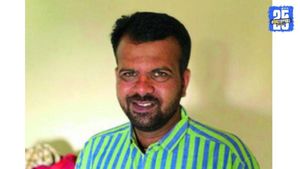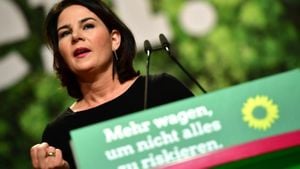Ukrainian President Volodymyr Selenskyj has created ripples internationally by declaring his willingness to resign should it facilitate Ukraine's NATO membership. Acknowledging the precarious position of his nation amid Russian aggression, Selenskyj made this surprising statement during a press conference held on the anniversary of Russia's invasion of Ukraine.
Addressing reporters, Selenskyj remarked, “If it is absolutely necessary for me to leave my post, I am ready to do so. I can exchange it for NATO membership – if such conditions exist, then immediately, without long discussions.” This declaration highlights the depths to which Selenskyj is willing to go to secure the safety and stability of Ukraine, demonstrating his prioritization of national security over personal political ambition.
Since the Russian invasion began three years ago, the question of NATO membership has become increasingly pressing for Ukraine. The West has been cautious, weighing the potential fallout of such a move, particularly concerning relations with Russia, which considers NATO’s eastward expansion as a direct threat. Selenskyj’s statement was made amid heightened discussions involving key international leaders, including former U.S. President Donald Trump and French President Emmanuel Macron.
Recently, President Macron indicated to Trump the importance of engaging Ukraine seriously within the European security framework. He underscored the progress made since discussions began, emphasizing, “We share your desire to create peace. Peace can’t mean the capitulation of Ukraine.” Macron’s statement aligns with Selenskyj’s focus on security guarantees from the West.
Meanwhile, Trump's remarks have been observed with skepticism. He is perceived to be wavering on the commitment to support Ukraine as he reportedly negotiates closer ties with Russia. The duality of Trump’s statements alongside NATO's hesitations portrays the fragile balance Ukraine finds itself within the global diplomatic sphere.
Selenskyj’s conditional resignation offer signals desperation as much as determination. He is well aware of the challenges his government faces domestically, especially as opinions diverge among the Ukrainian populace about the nature of international aid and support. An alarming poll revealed 46 percent of Germans surveyed preferred the cessation of military or financial assistance to Ukraine—showing growing fatigue and divergence of opinions across Europe.
The NATO question is not merely theoretical; it embodies the strategic future of Ukraine. Selenskyj has articulated well the stakes involved, stating, “I am focusing on the security of Ukraine today and do not intend to be in power for decades.” This reflects both urgency and pragmatism as the Ukrainian leader navigates uncertain waters wrought by external pressures and internal conflict.
Despite the uncertainties surrounding NATO’s acceptance of Ukraine, Selenskyj’s tactical move has drawn attention to the dire situation his country faces. His readiness to sacrifice personal power for institutional security raises significant questions about leadership and governance under threat. How far must one go to protect their nation’s sovereignty?
Observers have noted this as both brave and risky as it opens the door to potential instability during times of crisis. It could portray Selenskyj as either selfless or politically fragile—depending on the outcomes of these international negotiations.
The political future of Ukraine hangs precariously as talks progress. Russia, emboldened with its anti-West rhetoric, continues to demand conditions for peace, often proposing scenarios unacceptable for Ukraine without consideration for its territorial integrity. These developments exacerbate the vulnerability of Ukrainian governance at the crossroads of potential aggression from both Russia and wavering Western alliances.
With talks reportedly imminent between Trump's administration and Russia, Selenskyj's remarks could take on new relevance. His potential resignation might not just shake the leadership within Ukraine but could resonate deeply as international policy and commitments are reevaluated.
Selenskyj’s unprecedented offer serves to highlight the extreme circumstances under which leaders operate amid conflict. Understanding the ramifications of such actions is important as the response from NATO and Western powers becomes increasingly pivotal. This drama not only shapes Ukraine’s immediate future but reverberates across Europe, potentially redefining alliances amid longstanding geopolitical tensions.
Settling on whether the West, especially NATO, will support Ukraine effectively encapsulates the existential crisis faced by Selenskyj. His resolve to maintain the integrity of his country, even on such precarious terms, sheds light on the resilience and hardships underscored within the neighboring territories under duress.
The world watches closely, and how the narrative evolves could define not just Ukraine’s path forward but also the very principles of democracy and sovereignty within the global order.



